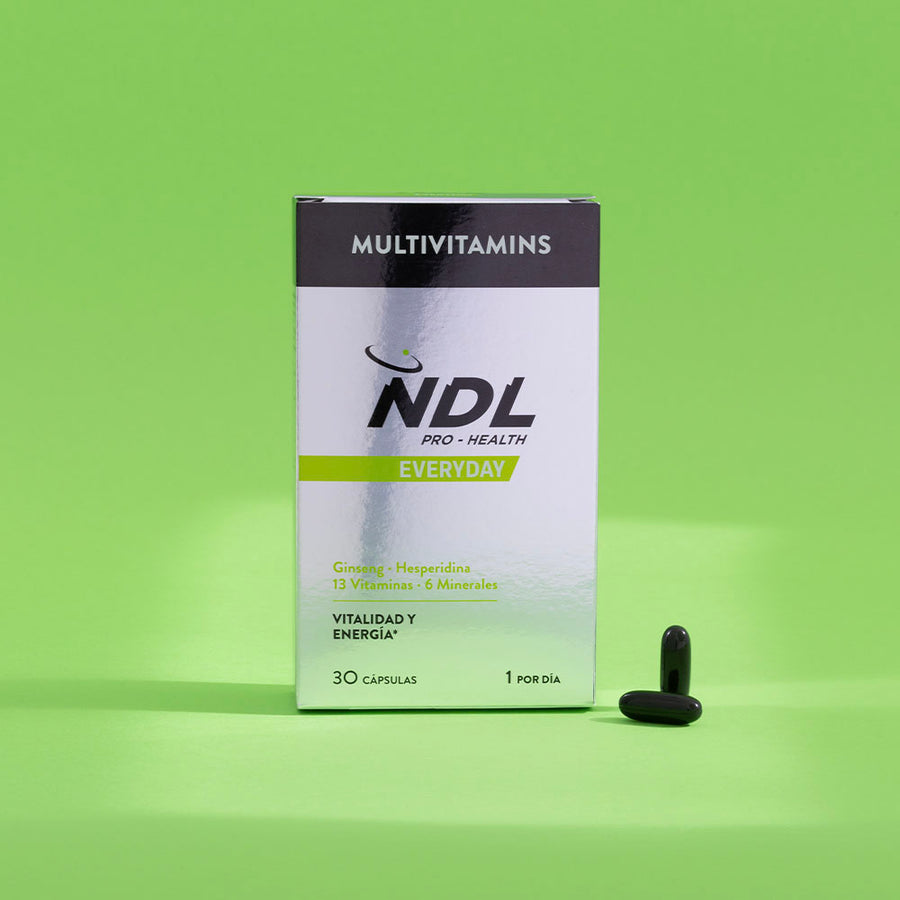Featured Products

Multivitamins and Minerals
See productIn an increasingly fast-paced world, maintaining a balanced diet can be a real challenge. Stress, tight schedules, and unhealthy habits often prevent us from meeting all the nutritional needs our bodies require daily. In this context, multivitamins have become a popular ally to support the diet and contribute to overall well-being.
However, with the wide variety of options available on the market, a key question arises: what is the best multivitamin? The answer isn’t simple, as it depends on factors like age, lifestyle, individual needs, and even the format that best fits your routine.
In this article, we’ll help you understand what makes a good multivitamin, who it’s especially recommended for, and how to choose the best option for you.
What is a multivitamin and what is it for?
A multivitamin is a nutritional supplement that combines a variety of essential vitamins and minerals into a single formula. Its main purpose is to complement your daily diet and help fill potential nutritional gaps — especially when dietary intake falls short of recommended levels.
These supplements are designed to support multiple body functions, including:
- The immune system, thanks to nutrients like vitamins C, D, and zinc.
- Energy production, supported by B-complex vitamins.
- Bone and muscle health, aided by calcium, magnesium, and vitamin D.
- Metabolism, skin, hair, and cognitive function, among others.
It’s important to note that a multivitamin should not replace a varied and balanced diet, but rather serve as a punctual or ongoing support during times when your body needs an extra boost.
Who should take a multivitamin?
While anyone may benefit from additional micronutrients at certain times, there are specific population groups for whom taking a multivitamin can be especially helpful:
- People with restrictive diets: those who follow vegetarian or vegan diets, or who have food intolerances, may struggle to meet their needs for nutrients like vitamin B12, iron, zinc, or calcium.
- Athletes and people with high physical demands: intense physical activity increases energy expenditure and the need for certain micronutrients. A multivitamin can help replenish those losses and improve recovery.
- Adults over 50: as we age, nutrient absorption decreases and needs change. Vitamins like B12, D, and calcium become especially important in this stage.
- People under high stress or chronic fatigue: ongoing stress can deplete stores of nutrients vital for mental and physical balance, such as magnesium, B vitamins, and zinc.
- People with unbalanced diets: diets low in fruits, vegetables, legumes, or whole grains can result in mild nutrient deficiencies. A daily multivitamin can be a helpful tool in these cases.
In short, multivitamins aren’t just for people with diagnosed deficiencies, but also for those whose lifestyle or personal circumstances may warrant additional nutritional support. Identifying whether you belong to one of these groups is the first step in deciding if a multivitamin can help you maintain health and well-being.
What should a good multivitamin contain?
Not all multivitamins are the same. A product’s quality depends not only on the number of ingredients it contains, but also on the selection, dosage, and chemical form of each nutrient. Here are the key features a good multivitamin should have:
-
Essential vitamins in balanced doses: a comprehensive multivitamin should include vitamins such as:
- Vitamin A: for vision and skin health.
- B-complex vitamins (B1, B2, B6, B12, folic acid...): essential for energy production and the nervous system.
- Vitamin C: for antioxidant protection and immune support.
- Vitamin D: crucial for bone and immune health.
- Vitamins E and K: with antioxidant and blood-clotting functions, respectively.
-
Key minerals: it should also provide adequate amounts of minerals, including:
- Magnesium and calcium: for muscle and bone function.
- Zinc, selenium, and copper: for antioxidant and immune functions.
- Iron: if needed — especially for women of reproductive age or people with anemia.
- Iodine: essential for thyroid function.
-
Bioavailable forms of nutrients: it’s important that nutrients are in forms the body can easily absorb. For example:
- Methylfolate instead of folic acid.
- Vitamin B12 as methylcobalamin.
- Magnesium as citrate or bisglycinate, which is better absorbed than oxide forms.
- No unnecessary excess: more is not always better. Avoid multivitamins with megadoses or imbalanced formulas that can be harmful if taken long term.
- Other quality factors: free from artificial additives, colorants, or added sugars; suitable for your dietary profile (vegan, gluten-free, lactose-free…); and manufactured under quality standards and certifications (GMP, ISO…).
How to choose the best multivitamin for your needs
Choosing the right multivitamin isn’t about finding the one with the most ingredients or highest doses, but rather the one that fits your age, lifestyle, and health goals. Here are some guidelines to help you make an informed decision:
- According to your age and sex: nutritional needs change over time and vary between men and women. Younger men and women may need more B vitamins, and women may require more iron. Adults over 50 often need more vitamin D, B12, calcium, and antioxidants. Pregnant women should opt for specific formulas with folic acid, iron, and iodine.
- According to your lifestyle: if you lead a very active life or engage in regular exercise, prioritize formulas that support energy metabolism, muscle function, and recovery. If you experience high levels of stress or fatigue, look for formulas with adaptogens or nutrients that support the nervous system. On vegetarian or vegan diets, make sure your multivitamin includes B12, iron, zinc, and plant-based omega-3 if possible.
- According to your preferred format: consistency depends on choosing a format that suits your routine. Tablets and capsules are the most common and easy to store. Powder or sachet options are ideal for people who struggle to swallow pills.
In conclusion, multivitamins can be a valuable ally in maintaining nutritional balance, especially during demanding periods or when diet alone doesn’t fully meet your needs. However, not all products are created equal — and not all are right for everyone.
The best multivitamin is the one that fits your age, lifestyle, and specific needs, with a balanced formula, safe dosages, and high-quality, well-absorbed ingredients. Making a thoughtful choice — and seeking professional advice if needed — is key to getting real benefits.
Remember: supplements are not a substitute for a healthy diet, but they can complement it and help you feel better every day.

From the NDL Pro-Health team we will provide you with tips to maintain a healthy lifestyle. Sharing knowledge and product recommendations to offer optimal solutions for your daily routine, for your workouts and subsequent recovery, all with the goal of helping you achieve physical and mental wellness.

















